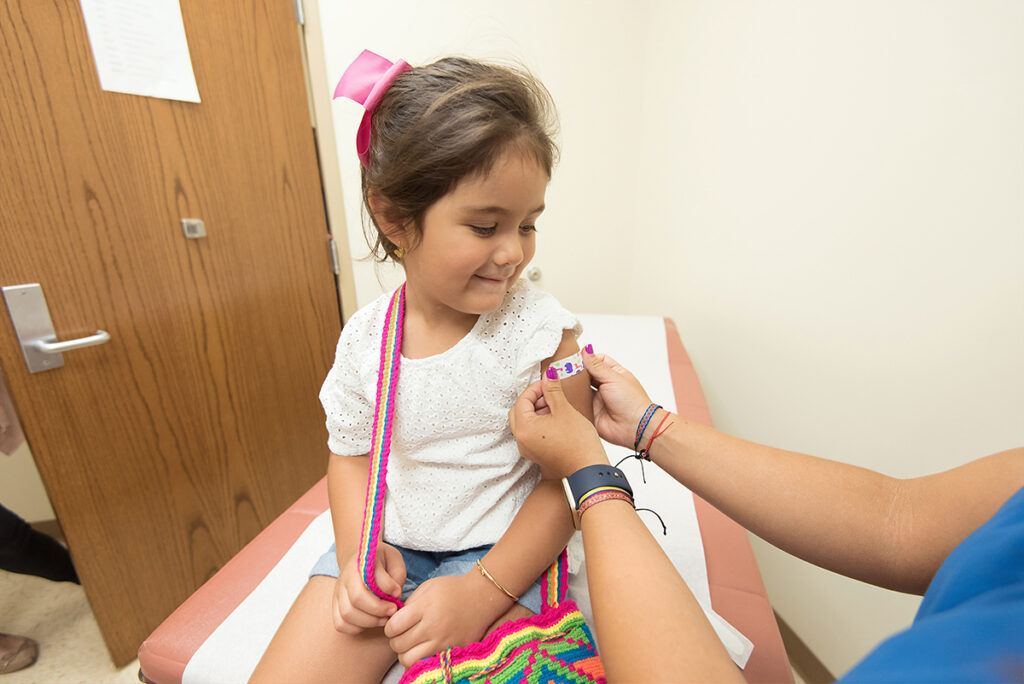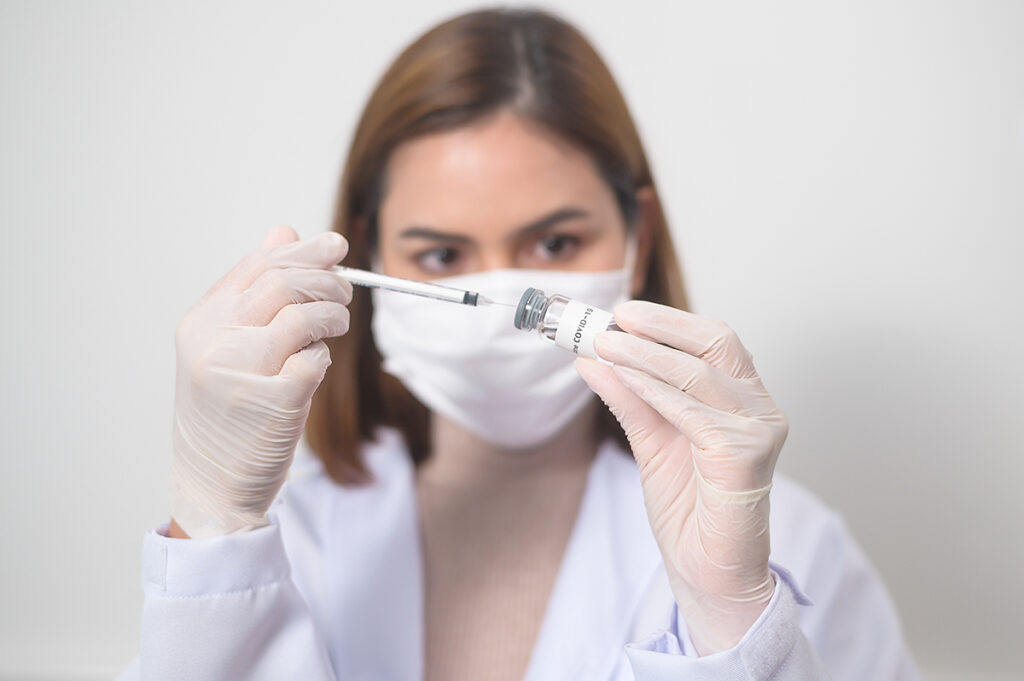Contents:
- Why the intranasal form of interferon-α2b is valid for COVID-19
- Prevention of COVID-19: When is it essential to use interferon-α2b intranasally
- Role of intranasal interferon-α2b in the treatment of COVID-19
- Conclusions
- Sources
Why is The Intranasal Form of Interferon-a2b Helpful in COVID-19?
All mechanisms of antiviral immunity are activated and work through the interferon system. Interferon is such a versatile and effective tool against viruses that those viruses that cannot block or bypass the interferon system become harmless.
COVID-19 is an acute respiratory syndrome caused by the SARS-CoV-2 coronavirus. This coronavirus has several mechanisms to block the production of interferon by cells in the body. Therefore, the immune response to infection is delayed, and the virus can multiply and infect almost all organs and tissues: lungs, heart, liver, kidneys, blood vessels, brain.
The SARS-CoV-2 coronavirus suppresses interferon production because interferon is its Achilles’ heel. If there are enough interferon molecules where the virus penetrates, then the immune system quickly destroys viral particles and infected cells, so the disease does not have time to develop. To compensate for the lack of interferon and stimulate its production in the body when infected with SARS-CoV-2, scientists and then medical officials from different countries recommend using interferon preparations in the first hours and days after infection. The list of sources is in the Appendix.
The main route of penetration of SARS-CoV-2 into the body is through the epithelium of the upper respiratory tract. That is the gateway to infection. The main burden of protecting the body from the virus falls on the local immunity of the upper respiratory tract.
Intranasal form of interferon supports antiviral immunity in the epithelial cells of the nose – where the risk of infection is highest. The area of the nasal epithelium is small. Therefore small doses of interferon are required to obtain a beneficial effect. With intranasal administration, interferon is not detected in the blood and does not cause side effects. It allows intranasal interferon for particular groups of the population: pregnant women, newborns, people with immunodeficiency.
Proper dosage of intranasal interferon is the most critical factor for the widespread use of this form. For example, in the United States, the intranasal form of interferon is not used because, in the first studies, scientists used large doses and received severe side effects. The doses used in the United States are now used for the systemic treatment of chronic viral diseases. The size of these doses is 50-200 times higher than the concentration of interferon in modern intranasal interferon preparations.
Interferon alpha-2b (IFN-α2b) is the most used of the interferon family. Its functions, features, limitations are well studied. IFN-α2b for intranasal use is the recombinant interferon. It is produced in a genetically engineered way. Therefore it is safe, unlike the first interferon preparations, which were made from blood components.
Prevention of COVID-19: When to Use Interferon-a2b Intranasally
Coronavirus enters the body through the mucous membranes of the respiratory tract, gastrointestinal tract, and eyes. To prevent the disease, all these places need to be protected. However, the most important thing is to protect the nasal epithelium. Intranasally administered IFN-α2b stimulates epithelial cells to produce their interferon. The intrinsic interferon increases the activity of phagocytes – immune cells that destroy viral particles and infected cells. However, the action of intranasal interferon lasts only for a few hours. Therefore, in situations where the danger of infection is severe, it is used several times a day.
Doctors in COVID-19 wards are at the most significant risk of infection. They can receive dozens of infectious doses of coronavirus per day. Even a perfectly functioning immune system is unable to cope with such a load. Therefore, particular sets of measures have been developed for doctors to protect against infection.
Chinese experts investigated the effectiveness of physical protection and drug prevention with intranasal IFN-α2b against coronavirus infection. The drug was used 4 times a day, 2-3 drops in each nostril. As a result, for 28 days of the study, there was not a single case among 2944 doctors. Among doctors who did not receive interferon, 3,062 people developed pneumonia caused by COVID-19. According to the study results, intranasal IFN-α2b was included in the national guidelines for preventing coronavirus infection.
Immunocompromised and elders are at particular risk for COVID-19. Their disease can take on a chronic form and last 2-4 months. With a high viral load, such patients have been prescribed plasma transfusions from recovering people. Sometimes this procedure is performed several times. The viral particles that survived after the first procedure become resistant to antibodies. Scientists believe that new strains arise precisely in such cases. For example, a particularly contagious strain from the UK most likely emerged due to long evolutionary dynamics in one patient with suppressed immunity and a chronic coronavirus disease. Therefore, the prevention of COVID-19 in people with immunodeficiency should also consist of a set of protective measures.
Cuban doctors have investigated the safety and usefulness of the intranasal form of IFN-α2b to protect immunosuppressed people from COVID-19. The study involved 15 people with end-stage chronic kidney disease. These people could not comply with the requirements of self-isolation since they were on a hemodialysis program. They had to visit medical centers, contact doctors and other patients regularly. These patients received one drop of IFN-α2b in each nostril for 10 days. As a result, during the 45 days of the study, there was not a single sick person.
Pregnancy is at risk for severe COVID-19. The coronavirus puts stress on the cardiovascular system and lungs, which are already stressed during pregnancy. According to statistics, pregnant patients are six times more likely to require intensive care than non-pregnant patients of reproductive age. Postpartum complications are also seen more in those infected with COVID-19. Coronavirus infection increases blood clotting and can limit the supply of oxygen and nutrients to the fetus.
As a drug prevention of COVID-19 in pregnant women, the Ministry of Health of the Russian Federation recommended using only the intranasal use of recombinant IFN-α2b. For more details, see section 7.3 “Temporary methodological recommendations. Prevention, Diagnosis and Treatment of Novel Coronavirus Infection (COVID-19)”, version 10, dated February 8, 2021.
Families with COVID-19 are at increased risk. Infections often occur due to close contacts within the family as they cannot be avoided when living together.
To stop the increase in the number of diseases, the leadership of the Khanty-Mansiysk Autonomous Okrug of the Russian Federation provided families of patients with an intranasal drug IFN-α2b. Together, after a month, prevention measures led to a 20% decrease in the number of new cases of COVID-19.
Plant workers are often associated with the maintenance of a continuous production process. The risk of stopping production is associated with losses from damage to complex units, such as blast furnaces, or loss of crops, as in agricultural firms. Several Russian enterprises followed the recommendations of the Ministry of Health of the Russian Federation and provided their employees and their family members with the intranasal preparation IFN-α2b, complete with other means of protection.
Some of these enterprises are the steel company Novolipetsk Metallurgical Plant, the iron ore producer Metalloinvest, the fertilizer producer Fosagro, the Talina agricultural holding, and Russian Railways.
All segments of the population are at risk of contracting COVID-19. No one knows in advance how the body will react to illness. Options range from asymptomatic to disability and death. The severity of the disease depends on the number of viral particles that have entered the body. Anyone who wants to stay healthy will strive to use all the opportunities not to get sick. Intranasal form of IFN-α2b is one such possibility. It is easy to use, efficient and low effort.
Role of Intranasal Interferon-a2b in The Treatment of COVID-19
To combat COVID-19 and maintain vital organ function, doctors use systemic medications. However, intranasal IFN-α2b can reduce viral load and alleviate the disease in a small, isolated part of the body – the epithelial cells of the nose.
If a patient with coronavirus uses intranasal interferon, the risk of infection in healthy people in contact with him is reduced. The effect is based on reducing the number of viral particles in the air that the patient exhales.
There are some studies on the effect of the intranasal form of IFN-α2b on the course of the disease in other respiratory infections. For example, in military personnel with ARVI, the drug reduces the risk of developing pneumonia by 1,3 times. Reception scheme: 3 drops in each nasal passage 2 times a day for 2 weeks.
Another study involved pregnant women with ARVI. The test group took the intranasal form of IFN-α2b, 3 drops in each nasal passage 5-6 times a day. As a result, the participants in the test group showed clinical improvement 2 days earlier than in the control group, and the duration of the disease was almost halved.
A study of the therapeutic effect of IFN-α2b in children under 3 years of age with ARVI also showed the drug’s effectiveness. 2 days after the start of treatment, the release of viral antigens in the nasal passages decreased. Clinical improvement was also faster in the IFN-α2b group than in the control group.
Conclusions
Interferon preparations successfully suppress the SARS-CoV-2 coronavirus in the early stages of the pathogen entering the body.
The intranasal form of IFN-α2b stimulates local immunity in the epithelial cells of the nose, where the infection is most common.
The most effective use of IFN-α2b for the prevention of COVID-19 is as part of a set of protective measures. The main direction of prevention: doctors, people with immunodeficiency, the elderly, pregnant women and families with sick people.
In the treatment of COVID-19, intranasal interferon reduces the viral load in the nasal epithelium, which facilitates the patient’s illness and reduces the risk of infection of others.
Sources
- Intranasal interferon-alpha 2 for prevention of natural rhinovirus colds
- An experimental trial of recombinant human interferon alpha nasal drops to prevent COVID-19 in medical staff in an epidemic area
- Diagnosis, treatment, and prevention of 2019 novel coronavirus infection in children: experts’ consensus statement
- Safety and efficacy of intranasal recombinant human interferon alfa 2b as prophylaxis for COVID-19 in patients on a hemodialysis program
- Временные методические рекомендации. Профилактика, диагностика и лечение новой коронавирусной инфекции (COVID-19). Министерство здравоохранения Российской Федерации
- A field trial of recombinant human interferon alpha-2b for nasal spray to prevent SARS and other respiratory viral infections
- A multicenter, randomized,controlled clinical study on efficacy and safety of recombinant human interferon α 2b spray (P.putida) in treatment of acute upper respiratory tract infection in children
- Recombinant human interferon alpha 2b broad-spectrum anti-respiratory viruses pharmacodynamics study in vitro
- Subcutaneous injection of IFN alpha-2b for COVID-19: an observational study



